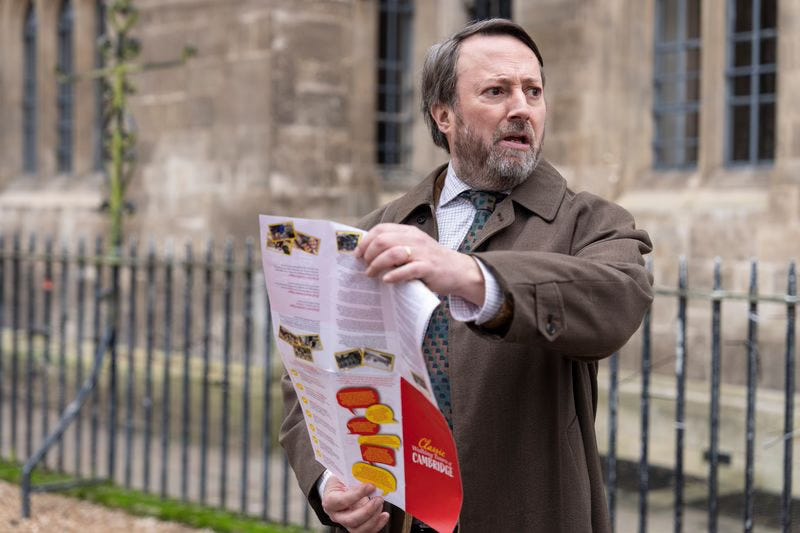At first blush, BritBox’s “Ludwig” presents as a miniseries conceived by a committee anxious to leave for lunch.
The plots of all six episodes are variations of the “locked room mysteries” made famous by Agatha Christie and feature the shop-worn archetypes of twin substitution, the socially awkward sage, and the wise mentor.
That said, “Ludwig” is so well written and acted none of it matters.
John Taylor (David Mitchell) is a housebound, neurodivergent genius who makes his living as the “Elvis Presley of puzzle setters,” a bestselling creator of puzzles who writes under the nom de plume “Ludwig.”
His identical twin brother James is Chief of Detectives in the Cambridge Police Authority who has disappeared without a trace. James’ wife Lucy (Anna Maxwell Martin), a childhood friend of the brothers, asks John to pose as James in order to find out what happened to him.
John’s neurodivergence is made vivid halfway into the first episode. A murder investigation spirals into a panic attack and he runs to an empty car where he calls Lucy. John says:
I want to go home. My home, my house, my life. I can’t do this, Lucy. I don’t know how anybody can. I don’t know how James ever did.
I’m not talking about his job, I‘m talking about all of it. I’m talking about just getting up in the morning and leaving the house and coming out here to this! All this! Crowds and noise and buildings and offices and computers and people! Nobody seeing each other and everybody talking at once.
Alarms going off, phones ringing. Everybody moving around, up and down and in and out, and no order to any of it. No structure, no purpose!
It is here, in this intense monologue, that we see “Ludwig” aspires to be more than a provincial police procedural.
Our pulse quickens as John pours his trauma into a decades-old mobile phone. He publicly solves murder cases and privately searches for his brother, but the struggle to manage his neurodivergence is the most compelling.
When Lucy, the patient mentor, reminds him that his identical twin brother overcame those same feelings John replied, “[i]t was easier for him. He had you.”
Dramatizing John’s mental health struggles, however, creates the first of two significant plot holes, as he goes implausibly from a housebound agoraphobic to a “super cop“ in the space of a fortnight.
I get it. It is not possible to overcome a pervasive disorder in six episodes, and needs must when the devil drives.

A second plot hole is created as the best cops in Cambridge somehow never knew their Chief of Detectives had a famous twin brother and were oblivious to Lucy and John’s duplicity, despite John/James’ abrupt inability to drive a car.
I excuse this on the same grounds as his unlikely emotional progress, as “Ludwig’s” high production values warrant suspension of disbelief.

John’s unique gifts are demonstrated In Episode Two when a wife turns up at the station tearfully reporting her husband didn’t come home. His partner is uninterested, saying “he’ll probably rock up later today with a bad hangover and lipstick on his collar,” but John sees danger.
He discovers the husband’s murder by noticing a patch of recently applied wallpaper and a clean, concrete planter adjacent to a weathered one. The Sherlock Holmes reference is clear, as he admonished Watson, “you see but you do not observe,” (A Scandal in Bohemia).
“Ludwig” features note-perfect guest appearances, including Felicity Kendal (above), Derrick Jacobi (below), and Hammed Animashaun who provides one of the finest moments as a team-building leader who vigorously defends the apothegm: “an individual may win a game, but only a TEAM can win a championship.”
The locked room mystery formula is carefully followed. In Episode Five Ludwig solves a murder at a boarding school which literally takes place in the Headmaster’s locked office, its only key intact on the inside.
We meet John’s aging mentor, Mr. Todd (Jacobi), and flashback to the inevitable abuse visited upon sensitive, intellectual boys at the hands and feet of fellow students.
The acting is uniformly excellent. Dipa Ola as DI Russell Carter gives a restrained performance that adds pathos to unexpected plot points and Alice Maxwell Martin’s Lucy Betts-Taylor quietly drives the plot while tempering the search for her husband with sensitivity to John’s condition.
In the end, “Ludwig” belongs to David Mitchell, who you may remember from “Peep Show” or his turn as Shakespeare in the most merry “Upstart Crow” which — verily — bears many watchings.
Mitchell’s performance is filled with a depth hinted at but never fully realized in a career of roles in sitcoms and sketch comedy.
“Ludwig” is the bingeable, quality TV we all need right now.
“Ludwig” was produced by the BBC in partnership with ITVS and Big Talk Productions. It premiered in the US on BritBox March 25, 2025. All six episodes are now available for streaming. You can find more information here.
Cover image: David Mitchell (Ludwig) - Courtesy of Britbox.







Peep Show is a fav so I'm all in on Ludwig. Thanks for the review!